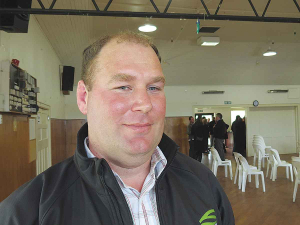OPINION: For many farmers, the biggest regulatory challenge they face is the myriad things that the Resource Management Act throws up.
At the recent Central Districts and South Island Field Days, I talked to several farmers about the dramas they were having and heard about eye watering costs that they have faced in getting and renewing resource consents. In many instances these costs were six figures.
I also heard about this ridiculous scenario where farmers are struggling to get long-term loans due to only being issued short-term consents - it's hard to get a 20-year loan when the consent that allows you to effectively conduct business is for only 5 years. This provides little in the way of surety to the bank, or to the farmer or grower themselves regarding future planning.
Then we have this other matter of SNAs, which have rightly been viewed as a breach of property rights. The same concern has also existed with the mapping of Sites of Significance for Maori (SASM) and Outstanding Natural Features and Landscapes (ONFL), and we've recently seen Hutt City and Gore District Councils go a little crazy with the digital paint brush in this space.
These are just some of the many absurd situations resulting from our resource management system which undermine the confidence that farmers and businesses need to have to invest in new technology and innovation.
This is why we have embarked on a programme of reforms which seek to put the enjoyment of property rights at the centre of resource management.
On the SNA front, we immediately prioritised the pause on any mapping of SNAs under the National Policy Statement for Indigenous Biodiversity (NPS-IB) as part of the 100-day plan. This was to stem the bleeding and give us time to conduct a review of their operation and occurred alongside several other surgical changes to provide some interim RMA pain relief.
This review has raised massive questions about the significance of some of the SNAs that have been mapped. When the Department of Conservation effectively manages one third of New Zealand, you might ask how much further we need to go into mapping things on people's private property to protect our significant biodiversity. Sure, there may be cases where there is a need protect the last of some endangered fauna, but it's fair to say the current line is drawn far beyond this.
It is important to point out that despite this pause and review under the NPS-IB, we are still stuck with the broader RMA section 6 obligations around biodiversity, ONFLs, and SASMs. This begs the question: what should we do about that?
We have decided that the only way to sufficiently address these issues around SNAs - and all these other problems facing farmers for that matter - is to undertake wholesale replacement of the RMA. ACT prioritised this in its coalition agreement with National, recognising that the continuous tinkering of this fundamentally flawed legislation over the last 30 years has failed to deliver the relief Kiwis need.
My colleagues have recently announced this Government's way forward on replacing the RMA, centring on the enjoyment of property rights. Whilst much of this detail is still a few months away, what was announced gives a clear steer on the direction we intend to take, and it's clear this will deliver overdue relief to our farmers.
A property rights focus means there must be a much higher bar for infringement on people's property rights, and that we must consider pathways for compensation in some circumstances where property rights infringements are imposed for the 'public good'. If it is the public who benefits, why should private property owners pay? Establishing how this is applied in relation to how we encourage the protection of biodiversity will be a key area of work.
We will be looking at a range of options, and front of mind is ensuring farmers' great conservation leadership on their land is recognised rather than thrown back in their faces through blunt and overreaching regulation. We will turn the page on RMA section 6.
Going beyond SNAs and the likes, this new system will retain protections of the natural environment. Yet, while this will occur by way of environmental limits, we will do away with the blunt approach of requiring a consent for every activity through providing a range of horses for a range of courses. This will see many more activities permitted by right, common approaches codified into standards to avoid reinventing the wheel, and several other tools to manage effects across environmental domains. The goal? Fewer consents needed, fewer costs, more certainty, and less Wellington in the way of farming.
I encourage the rural community to make their voices heard in this process so we can get this right.
Andrew Hoggard is the Associate Minister for Agriculture.


















